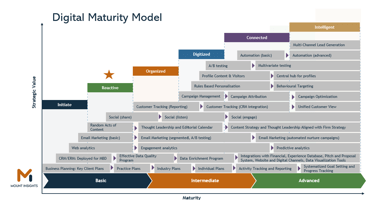
Where does your firm law fall in digital maturity?
Michelle Woodyear
In a recent survey conducted by the Legal Marketing Association, it was revealed that a staggering 75% of respondents believed that their firms' business development and marketing technology capabilities were lagging behind their competitors. This sentiment was echoed in the Altman Weil Law Firms in Transition Survey, where more than half of law firms (56%) admitted to being behind their competitors in terms of technology adoption and innovation.
These findings highlight a crucial issue that law firms need to address in order to stay competitive in today's fast-paced digital economy. In this era of rapid technological advancements, it is imperative for law firms to embrace technology in order to remain relevant and thrive in the industry. Failure to do so can result in being left behind by more agile competitors who are adept at leveraging technology to drive growth and innovation.
A recent report by McKinsey & Company found that leading law firms are investing heavily in digital transformation initiatives, with some firms dedicating up to 10% of their revenue to technology investments.
Law firms that don't keep pace with this level of investment risk falling behind their competitors in terms of efficiency, profitability, and client satisfaction.
Law firms can use technology to streamline their operations, enhance client experiences, and ultimately, boost their bottom line. Areas where technology can make a significant impact include:
Business development - Savy firms are combing financial and market data to identify targets and empower lawyers to expand existing business by cross-selling services across practice groups.
Marketing - Traditional methods of attracting clients and promoting services are no longer as effective in today's digital landscape. Law firms that fail to adapt to data informed marketing strategies and tools risk losing out on potential clients to their tech-savvy competitors.
Content marketing - By incorporating technology into their marketing efforts, law firms can leverage social media, content marketing, and search engine optimization to reach a wider audience and generate more leads.
Legal Practice Management - Technology can greatly improve the efficiency and productivity of law firms. Manual processes and paperwork can be time-consuming and prone to errors. By implementing practice management software, firms can automate routine tasks, manage documents more effectively, and streamline workflows. This not only saves time but also reduces the risk of errors and increases overall productivity.
Client Portals - Online portals and mobile apps allow clients to access case updates, communicate with their attorneys, and securely share documents. This level of accessibility and transparency not only improves client satisfaction but also strengthens client relationships and fosters trust.
It is evident that law firms cannot afford to ignore the importance of technology in today's digital age. Embracing technology is no longer a luxury but a necessity for firms that want to remain competitive. By investing in the right tools and staying up to date with the latest technological advancements, law firms can position themselves as industry leaders and ensure continued growth and success.
Worried your firm is falling behind? Mount insights can help you assess your digital maturity, identify strengths and areas for improvement, and assist you in creating a digital transformation roadmap.


Mount Insights Digital Maturity Model
Mount insights can help you assess your digital maturity, identify strengths and areas for improvement, and assist you in creating a digital transformation roadmap.
